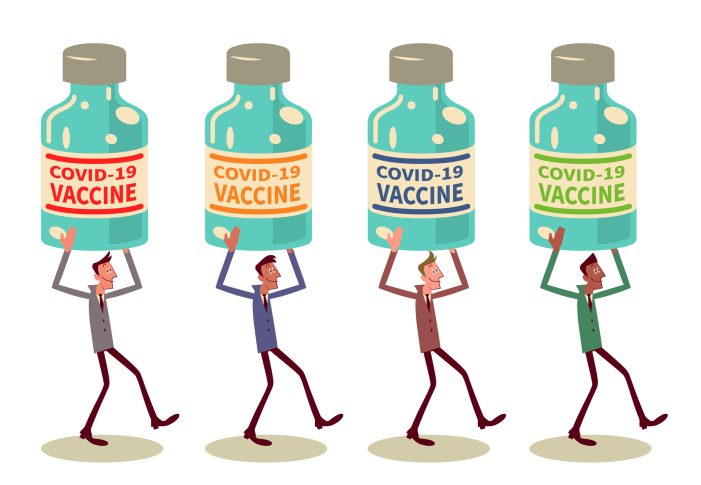FDA Approves Fourth COVID Shot. Fifth Shot Considered.

On Mar. 29, 2022, the U.S. Food and Drug Administration (FDA) approved a second booster dose (a fourth shot) of the Pfizer/BioNTech messenger RNA (mRNA) biologic BNT162b2 (“Comirnaty”) and Moderna/NIAID mRNA-1273 (“Spikevax”) for people 50 years of age and older, as well as younger individuals who are immunocompromised. The second booster would be given no sooner than four months after the previous COVID vaccination.1 2
The biologics are each designed to be given in two-dose regimens—21 days apart for BNT162b2 and 28 days apart for mRNA-1273. Last year, the FDA approved a second booster of both biologics for certain segments of the U.S. population considered to be more susceptible to COVID. But due to concerns about waning protection for both the original two shots and the booster dose, the FDA decided a second booster dose is needed.3 4 5 6 According to Peter Marks, MD, director of the FDA’s Center for Biologics Evaluation and Research:
Current evidence suggests some waning of protection over time against serious outcomes from COVID-19 in older and immunocompromised individuals. Based on an analysis of emerging data, a second booster dose of either the Pfizer-BioNTech or Moderna COVID-19 vaccine could help increase protection levels for these higher-risk individuals.2
CDC Recommends mRNA COVID Shots for Second Booster Dose
The U.S. Centers for Disease and Prevention (CDC) has also recommended a second booster for those 50 years old and over, as well as immunocompromised individuals. The agency further said that adults who have received the original dose of Johnson & Johnson/Janssen’s Ad26.COV2.S COVID vaccine and a booster dose may now get a second booster dose of either the Pfizer BNT162b2 or Moderna mRNA-1273 biologic.7 In a statement released to the public, the CDC stated:
These updated recommendations acknowledge the increased risk of severe disease in certain populations including those who are elderly or over the age of 50 with multiple underlying conditions, along with the currently available data on vaccine and booster effectiveness.7
Based on a recent study by the CDC, the Ad26.COV2.S vaccine was found to be less effective at preventing serious illness and hospitalization from COVID, so the agency is recommending the Pfizer/BioNTech and Moderna/NIAID mRNA COVID shots over the J&J/Janssen product.8
Additionally, there have been concerns about the increased risk of blood clots and heart inflammation and neurological problems with J&J’s Ad26.COV2.S vaccine. On Dec. 16, 2021, the CDC’s Advisory Committee on Immunization Practices (ACIP) voted 15-0 to recommend the Pfizer BNT162b2 or Moderna mRNA-1273 biologics over J&J’s Ad26.COV2.S due to a growing number of reports of a blood clotting disorder known as thrombosis with thrombocytopenia syndrome (TTS) following vaccination with the J&J/Janssen product.9 10
Third COVID Booster May Be Approved in the Fall
The FDA is apparently considering approving a third booster dose (a fifth shot) of the Pfizer/BioNTech and Moderna/NIAID biologics later this year. “There may be a need for people to get an additional booster in the fall along with a more general booster campaign, if that takes place, because we may need to shift over to a different variant coverage,” Dr. Marks said. “It would not be surprising if there is a potential need.”1 11 12
The FDA plans to hold a meeting of its Vaccines and Related Biological Products Advisory Committee (VRBPAC) on Apr. 6 to discuss future COVID booster shots and whether the biologics need to be updated to better respond to SARS-CoV-2 variants. Representatives from the CDC and the U.S. National Institutes of Health (NIH) will participate in the meeting.11 13
Dr. Marks said:
Now is the time to discuss the need for future boosters as we aim to move forward safely, with COVID-19 becoming a virus like others such as influenza that we prepare for, protect against, and treat. Bringing together our panel of expert scientific external advisors in an open, transparent discussion about booster vaccination is an important step to gain insight, input and expert advice as we begin to formulate the best regulatory strategy to address COVID-19 and virus variants going forward.13
If you would like to receive an e-mail notice of the most recent articles published in The Vaccine Reaction each week, click here.
Click here to view References:
No comments:
Post a Comment